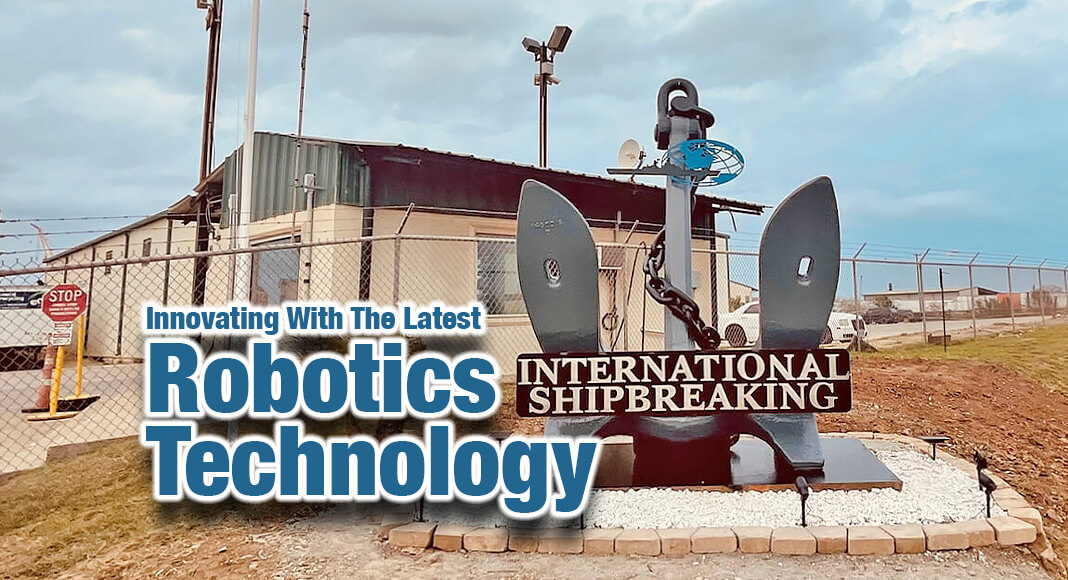
Texas Border Business
The future of shipbreaking is being mapped out in Brownsville, Texas, where leading marine recycler International Shipbreaking LLC (ISL), is set to introduce state-of the-art robotics to its operations.
Using innovative software developed by a team of academics and engineers in Massachusetts, these robots will in future assist the company’s employees in the cutting – or, more accurately, oxy-propane burning – of metal as some of the world’s largest vessels are decommissioned.
“As part of EMR, a global leader in sustainable materials, ISL is working to transform the global metal recycling industry. We’re utilising the latest technology to bring a range of benefits whether that’s to improve sustainability or increase safety,” says Roger Morton, Director of Technology and Innovation at EMR.
Shipbreaking can be among the most hazardous sectors of the metal recycling industry. Unregulated shipbreakers operating on the beaches of Bangladesh and India see dozens of fatalities a year due to collapsing structures or falling debris. While this is a world away from the strict conditions that ISL operates under – including risk assessments, regular external inspections and a culture that empowers staff to raise concerns – the potential for harm remains.
“Imagine you are a burning off 5ft portions of steel on the flight deck of an aircraft carrier like the USS Kitty Hawk and you’re in the 40°C Brownsville sun – wouldn’t you rather a robot did that?” says Roger. “These vessels were built in the 1950s and 60s and we have little or no data on what paints or other materials have got stuck behind the walls in the decades since then. Using a robot would reduce the risk to our staff while still utilising their expert knowledge to identify how and where to remove material.”
Under the new system, once a skilled ISL employee has planned out which section of the vessel needs to be removed, they will show the robot where to cut. The software being developed will then allow the robot to identify the desired cutting line, how far it extends and the best angle to position the attached torch. Operators can then stay a safe distance away while the robot burns along the line, dramatically reducing the risk of harm.
“EMR has always been a leader in safety and environmental standards but this new system, once fully developed, will also help ISL increase productivity and allow it to compete with those low-cost shipbreakers in Asia, encouraging more merchant ship operators and military customers to choose to recycle their vessels more sustainably,” says Roger.
The new robotic system is being developed by Assistant Professor Berk Calli and Doctoral Researcher James Akl in the Department of Robotics Engineering at Worcester Polytechnic Institute, Massachusetts. The first phase of the research is focused on testing the software that underpins the robotic system, giving it complex-shaped objects based on real-world examples of scrap metal and using this to create a ‘cutting point plan’. The team is now focused on how to control the oxy-propane cutting system automatically.
“We’ve already filed three patent applications and several papers and we’re not aware of anyone developing anything similar to this,” says Roger. “We are breaking new ground. The next step is merging the imaging and manipulation system with the cutting equipment and this part of the project will be the team’s focus over the next six to nine months.”
Once the technology is fully developed and has been rigorously tested it will then be manufactured commercially and made available to shipbreaking companies around the world, helping to improve the safety and sustainability of the industry as a whole.
“ISL is developing this technology because it is what we need to further increase safety standards at our sites,” says Roger. “But as a market leader, we also want to improve safety across the industry. And the productivity benefits that this system will offer for responsible recyclers should, we hope, help them compete with those operating shipbreaking on beaches who care neither about safety nor the environmental damage they do.”















